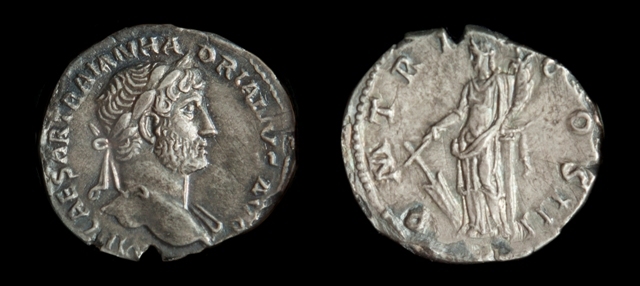Hadrian, Silver Denarius
Dublin Core
Title
Hadrian, Silver Denarius
Subject
Hadrian, Silver Denarius, Roman (Antioch ?) mint. 121 CE.
Obverse: Hadrian, laureate bust right, draped far shoulder. Inscription: IMP CAESAR TRAIAN HADRIANUS AUG (Imperator Caesar Trajan Hadrianus Augustus).
Reverse: Fortuna standing left, leaning on column, holding rudder and cornucopia. Inscription: P M TR P COS III (Pontifex Maximus, Tribunician Power, Consul for the third time).
Obverse: Hadrian, laureate bust right, draped far shoulder. Inscription: IMP CAESAR TRAIAN HADRIANUS AUG (Imperator Caesar Trajan Hadrianus Augustus).
Reverse: Fortuna standing left, leaning on column, holding rudder and cornucopia. Inscription: P M TR P COS III (Pontifex Maximus, Tribunician Power, Consul for the third time).
Description
Hadrian was known as a level headed and successful emperor, if not a bit reserved. He was very interested in Greek culture to the point that, when he was a young boy, he was called “Graeculus,” or Greekling, by his teachers. This interest in Greek culture influenced many of his politics and building aesthetics.
Hadrian is well known for the many building projects he instituted in Rome and elsewhere in the empire. The most famous of these projects is The Pantheon: originally built under the reign of Augustus by his closest friend and advisor, Agrippa, it burnt down in a fire in 80 CE. Little is known about the original structure, but, in 120 CE, Hadrian rebuilt the temple. That structure is what we still see in Rome today, though currently it functions as a Christian church. A few of his other famous projects were the Temple of Venus and Roma next to the coliseum, Hadrian’s Wall in Britannia, and the completion of the Temple of Zeus in Athens.
Hadrian died peacefully in 138 CE at his villa in Baiae. His successor was Antoninus Pius.
Hadrian is well known for the many building projects he instituted in Rome and elsewhere in the empire. The most famous of these projects is The Pantheon: originally built under the reign of Augustus by his closest friend and advisor, Agrippa, it burnt down in a fire in 80 CE. Little is known about the original structure, but, in 120 CE, Hadrian rebuilt the temple. That structure is what we still see in Rome today, though currently it functions as a Christian church. A few of his other famous projects were the Temple of Venus and Roma next to the coliseum, Hadrian’s Wall in Britannia, and the completion of the Temple of Zeus in Athens.
Hadrian died peacefully in 138 CE at his villa in Baiae. His successor was Antoninus Pius.
Source
Gift of James and Aneta McIntyre, Hallie Ford Museum of Art, Salem, OR. 2006.010.032
Date
121 CE
Rights
Hallie Ford Museum of Art
Format
0.734 in
0.100 oz
0.100 oz
Language
Latin
Type
Coin
Identifier
Hadrian
Coverage
This item is on view at Hallie Ford Museum of Art, in the Mark and Janeth Sponenburgh Gallery.
Citation
“Hadrian, Silver Denarius,” Hallie Ford Museum of Art Exhibits, accessed February 17, 2026, https://library.willamette.edu/hfma/omeka/items/show/143.
